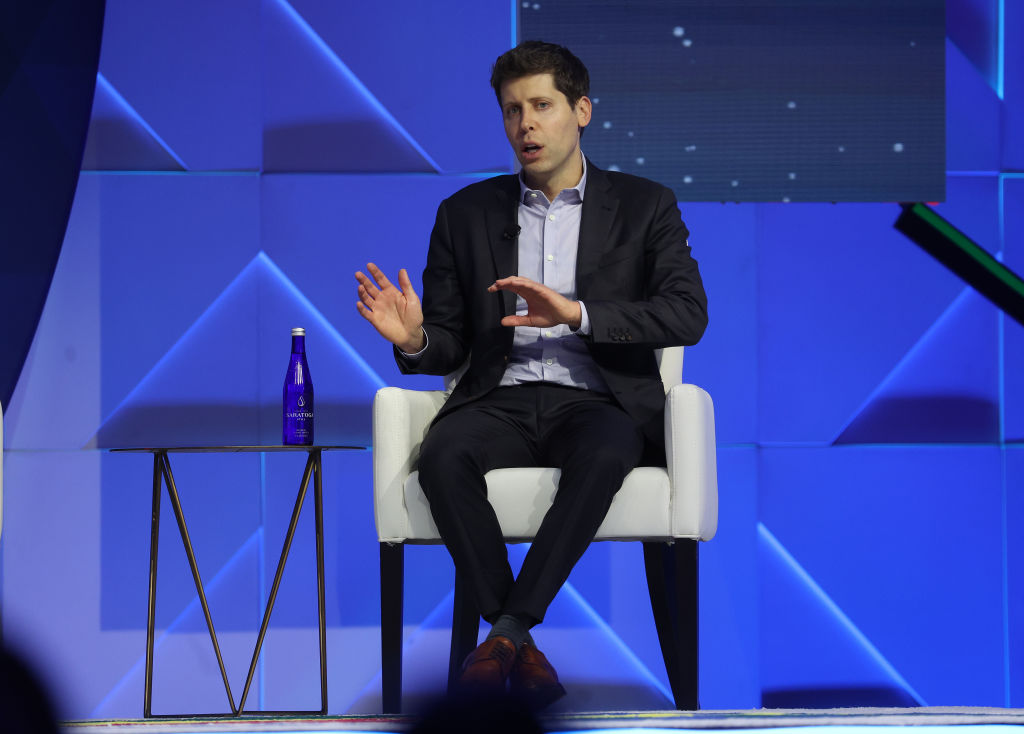
OpenAI said that Sam Altman was officially reinstated as chief executive officer and that it has a new initial board of directors, with Microsoft Corp. joining as a nonvoting observer.
The announcement Wednesday, a blog post penned by Altman, comes two weeks after the CEO’s shock firing from the artificial intelligence startup, followed by an operatic boardroom power struggle.
OpenAI also said that Mira Murati — who had been chief technology officer until Altman’s ousting when she was briefly named interim CEO — is once again the company’s CTO. OpenAI co-founder Greg Brockman will return as the company’s president after he quit in protest over Altman’s firing.
Microsoft, the company’s largest investor, had not previously had a position on the board before it took the observer role. The new directors are Bret Taylor, the former co-CEO of Salesforce Inc., who will be the chairman; Larry Summers, the former US treasury secretary; and Adam D’Angelo, a holdover from the previous board and the CEO of question-and-answer site Quora Inc. One of the directors’ primary tasks will be to build out a more permanent board.
In an interview Wednesday, Altman said the new board will be selected “fairly quickly.” He did not specify how many people will eventually be part of the group, but said it will be “significantly enlarged” from the current number. Asked whether he will rejoin the board, Altman said it’s “not a top priority” right now.
“OpenAI is ending the month of November with stronger governance and a governance foundation than it had when the month began,” Microsoft President Brad Smith told reporters in London on Thursday. “These kinds of steps are giving us more confidence. I think they should give government and should give customers more confidence.”
“I don’t see a future where Microsoft takes control of OpenAI,” Smith added, when asked.
In a note accompanying Altman’s post, Taylor said the new directors will aim to create a “qualified, diverse board.” Taylor also said the company will “enhance the governance structure of OpenAI.” The startup has been criticized for a structure that allowed a nonprofit board to oust the company’s CEO without consulting its largest investors.
OpenAI began in 2015 as a nonprofit research organization, but later shifted its structure to include a for-profit startup that has solicited investments and entered into partnerships with companies such as Microsoft to use its AI tools.The company is slated to be valued at $86 billion in a planned tender offer that will let some employees sell their stakes to outside investors.
As part of an an effort to “further stabilize the OpenAI organization,” Taylor said that company would convene an “independent committee of the board to oversee a review of the recent events.” Previously, Bloomberg reported that Altman agreed to an internal investigation of the conduct that led to his dismissal. Altman said in the interview that the new board members will oversee the inquiry and he “welcomes” it.
Summers said he will focus on increasing the size of OpenAI’s board and improving governance procedures for both the nonprofit and for-profit parts of its business. In an interview, he said the directors will undertake a “serious review and learn all the appropriate lessons,” but that he did not have any immediate comments on the investigation. He added: “We’ve only been on the board for half an hour.”
Ilya Sutskever, OpenAI’s chief scientist and co-founder, was one of the directors that fired Altman. Later, Sutskever said that he regretted his role in the ouster. Altman said in his blog post that Sutskever won’t be a board member, but that the company is “discussing how he can continue his work at OpenAI.”
Directors Helen Toner and Tasha McCauley will no longer be on the board. In a post on X, formerly Twitter, Toner said she officially resigned, and added, “I’ll be continuing my work focused on AI policy, safety, and security.”
Altman’s dismissal on Nov. 17 from the maker of the popular ChatGPT chatbot shocked the tech industry. That day, the board said in a statement that Altman was not “consistently candid” with OpenAI’s directors, “hindering its ability to exercise its responsibilities.”
The decision touched off a whirlwind five days at the company: Brockman quit in protest. Murati became interim CEO, moved to re-hire Altman, and was soon replaced as CEO. Meanwhile, nearly all of OpenAI’s roughly 770 employees signed a letter threatening to quit unless Altman was reinstated.
On Nov. 21, OpenAI said it reached a deal, in principle, to reinstate Altman as CEO and replace the board. In Wednesday’s post, Altman said that the company’s priorities going forward will be advancing its research, improving its governance structure and refocusing on its products. In the leadership chaos, some of the company’s customers had questioned how much to rely on the startup for their AI needs. Altman said that OpenAI didn’t lose any customers during the period in which he was ousted and then returned.
Asked how the startup plans to move beyond the events of the past few weeks, Murati said OpenAI will aim to make sure customers know it’s fully committed. “We need to get back to stability and get back on track this week,” she said.
After all that has happened, Altman said he feels tired, but also “more excitement and conviction than I’ve ever felt before.”
More Must-Reads from TIME
- Cybersecurity Experts Are Sounding the Alarm on DOGE
- Meet the 2025 Women of the Year
- The Harsh Truth About Disability Inclusion
- Why Do More Young Adults Have Cancer?
- Colman Domingo Leads With Radical Love
- How to Get Better at Doing Things Alone
- Michelle Zauner Stares Down the Darkness
Contact us at letters@time.com